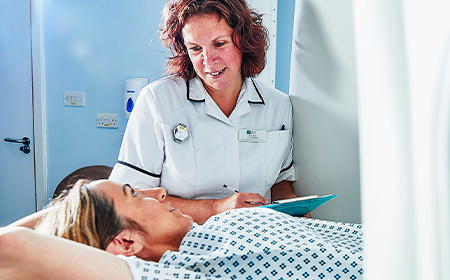When you arrive for your MRI scan at the Alexandra Hospital, you can park in one of the hospital’s free parking spaces.
Before the scan, you will be asked to fill out a short questionnaire about your health and medical history, and the radiographer will explain what will happen during the test.
Preparing for your MRI scan
In some cases, depending on why you are having an MRI scan, you might be advised to avoid food or drink for up to four hours before your MRI.
You will be asked to wear a gown and leave your clothing and belongings in a locker, so leave any valuables at home.
In preparation for the scan, you must remove any metal objects from your body.
During your MRI scan
During the scan, you will not feel anything, but you will need to lie very still to ensure the radiographer is able to get the clearest possible images. MRI scans are noisy, but that is entirely normal and nothing to be alarmed about. We will provide you with earplugs to block out the noise.
How long does an MRI scan take?
The scan should take anywhere from 15–90 minutes, depending on the area being scanned and the number of images required.
Your consultant might recommend the use of a contrast dye to enhance the clarity of the images of certain tissues, blood vessels or other parts of the body. This dye is injected into one of your veins using a thin tube called a cannula. The contrast dye is safe but we do not give it to pregnant women or patients with kidney problems.
Depending on the reason for your scan, your radiographer might be able to interpret your results on the same day. Otherwise, you will receive your results within a week.
What if I suffer from claustrophobia?
We understand that the idea of being in an enclosed space might be difficult for you.
If you have claustrophobia, we encourage you to come to The Alexandra Hospital to speak with your medical team. They will be happy to discuss any questions or fears you have and to discuss your options.
During the scan, you will be able to speak to the radiographer throughout the test through an intercom. You might also be able to have a friend or family member with you for support.
In extreme cases, you might be offered a mild sedative, but you will need to ensure that you do not drive yourself home after the scan.
 Magnetic resonance imaging, or MRI for short, is a safe, non-invasive imaging test that produces detailed images of the body's internal structures.
Magnetic resonance imaging, or MRI for short, is a safe, non-invasive imaging test that produces detailed images of the body's internal structures.


